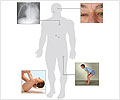Researchers at the Burnham Institute for Medical Research have revealed that enzyme replacement therapy may act as a potential treatment for preventing congenital rickets.
Headed by Jose Luis Millan, Ph.D., the discovery may trigger future clinical trials for HPP patients.Rickets is a softening of the bones resulting from a lack of vitamin D or calcium and from insufficient exposure to sunlight. Hypophosphatasia is a rare, heritable form of rickets caused by mutations in a gene called TNAP, which is essential for the process that causes minerals such as calcium and phosphorus to be deposited in developing bones and teeth.
The characteristics of Hypophosphatasia can vary depending on the specific mutation, with more severe symptoms occurring at a younger age of onset. The most severe form of the disease occurs at birth, which can present with absence of bone mineralization in utero, resulting in stillbirth.
For the study, Millan, tested the hypothesis that, if a a bone-targeted form of the TNAP gene is administered from birth, then it would relieve the skeletal defects of HPP.
Thus, the researchers created a soluble form of human TNAP having a strong attraction to bone tissue. It was later injected into the fat layer under the skin of the mice, and it was found that the treated mice maintained a healthy rate of growth and apparent well being, as well as normal bone mineral density (BMD) of the skull, femur and spine. Also, they noticed complete preservation of skeletal and dental structures after 15 days, without any trace of bone lesions after 52 days of treatment.
"While the biochemical mechanism that leads to skeletal and dental defects of HPP is now generally understood. There is currently no established medical treatment," said Millan.
Advertisement
Source-ANI
RAS/M











